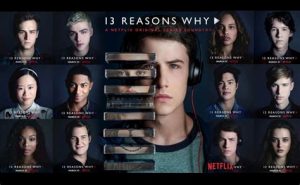13 Reasons Why, Season 2: Resources for Parents
13 Reasons Why, Season 2: Resources for Parents
Parents may recall an article I wrote in April 2017 following the controversial release of Season 1 of the Netflix series 13 Reasons Why. Click here to access.
With the release of Season 2 in late May, I want to remind parents of the importance of understanding the show’s content given its popularity among teens, and of the resources that are available to assist you when discussing the show with your daughter. The series has caused considerable concern in schools and the community due to its graphic content and mature themes, including suicide, date rape, bullying and harassment, alcohol and drug use and extreme violence.
It is important to note that the program is rated MA15+ in Australia, therefore the resources referenced in this article have been developed for secondary schools, parents and secondary school students. The resources are designed to help and support adults having conversations with teenagers.
You will recall that the first series met with differing opinions, as some argued that the portrayal of the main character’s motivations for suicide ignited authentic conversations regarding suicide, whereas critics were concerned that the show glamorised or normalised suicide. A key concern has been that the show portrays suicide as a way of exacting revenge and solving problems and conflict.
CEO of the National Youth Mental Health foundation headspace, Jason Trethowan, said 13 Reasons Why has shone a light on tough and difficult topics, bringing them into mainstream discussions. Mr Trethowan noted, ‘Television shows can provide parents and schools the opportunity to have conversations with young people about important issues which is great, however, there is the potential for these conversations to do more harm than good. Our aim is to ensure that young people, parents and schools are supported and equipped to have constructive conversations about the themes that are depicted in the show.’ headspace has provided support materials since the series began.
headspace Head of Clinical Practice, Vikki Ryall notes that, ‘The likelihood that the content will be distressing or triggering for some viewers will depend on their individual life experiences and current circumstances. No two people will take exactly the same meaning or understanding out of the same episode. By providing young people with tips on how to watch the show safely and ensuring they know how to seek help we can ensure distressed viewers can be supported.’
The headspace website includes a blog post which provides young people and parents with information to consider regarding the show. The blog post, which can be accessed here includes:
- tips for discussing the show safely
- points to consider before watching the show
- questions to help start a conversation.
- where to get help
This site also includes a link to a designated webpage 13reasonswhy.info which provides resources which have been produced in collaboration between headspace and Netflix. These include:
- Inclusion of warnings and help-seeking information before, and at the end of each episode of the show
- Videos – One features the cast of the show (coming out of character) to address issues depicted in the show, and the other features Australian young people talking about the importance of reaching out to family and friends and seeking help on mental health issues
- Resources – tailored discussion guides for young people and parents
- Help seeking information for young people.
Another useful website is the American site for the National Association of School Psychologists. This site recommends that parents view the series with their child.
I urge parents to read Claire Orange’s open letter to her sons which was published in the Sydney Morning Herald following the release of 13 Reasons Why Series 1, where she posits 13 Reasons Why Not. Click here to access the letter which outlines ‘13 reasons why suicide is not the answer’.
The School Psychologist, Amelia King, and the Wellbeing team will be available should parents, guardians or students wish to discuss any concerns.
If a young person is distressed and in need of support, they can call, contact or visit:
- St Catherine’s School Counsellor Amelia King counselling@stcatherines.net.au
- The Head of Year or Director of Student Wellbeing moconnor@stcatherines.net.au
- Kids Helpline (1800 55 1800) or kidshelpline.com.au
- eHeadspace (1800 650 890) or https://eheadspace.org.au/
- Lifeline (13 11 14) or https://www.lifeline.org.au/
- Suicide Line Victoria 1300 651 251
Merran O’Connor
Director of Student Wellbeing



